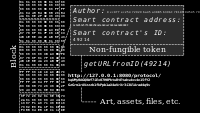
Photo from wikipedia
OBJECTIVE To compare the drug retention times and clinical efficacy of alternative tumor necrosis factor inhibitors (TNFi) and secukinumab in primary and secondary non-responders with ankylosing spondylitis (AS). METHODS AS… Click to show full abstract
OBJECTIVE To compare the drug retention times and clinical efficacy of alternative tumor necrosis factor inhibitors (TNFi) and secukinumab in primary and secondary non-responders with ankylosing spondylitis (AS). METHODS AS patients treated with biologics and enrolled in the Korean College of Rheumatology BIOlogics registry were examined. Patients who did not respond to previous TNFi treatment were defined as primary and secondary non-responders. Data regarding drug discontinuation and clinical efficacy (BASDAI50, ASDAS < 2.1, clinical important/major improvement in ASDAS, and ASAS20/40) were collected after 1 year. Kaplan-Meier and cox regression analyses were performed to compare drug survival and associated factors. Logistic regression analyses were conducted to compare the clinical efficacy secukinumab with that of alternative TNFi. RESULTS : In total, 124 patients (83 receiving alternative TNFi and 41 receiving secukinumab) had biologic changed due to clinical inefficacy. Drug retention rates in the alternative TNFi and secukinumab groups were similar (p = 0.096). Subgroup analyses of non-responders to previous anti-TNF monoclonal antibodies or a TNF receptor fusion protein (etanercept) revealed no difference between the alternative TNFi and secukinumab groups. However, subgroup analyses including only secondary non-responders revealed that secukinumab users showed a higher hazard ratio (HR) for drug discontinuation (HR = 3.77, P = 0.045). In addition, secukinumab was negatively associated with achieving BASDAI50 or a major improvement in the ASDAS. CONCLUSION : Alternative TNFi showed better drug retention and clinical efficacy in AS patients experiencing previous TNFi failure, in secondary non-responder. Therefore, alterative TNFi may be a more suitable treatment for secondary non-responders.
Journal Title: Modern rheumatology
Year Published: 2022
Link to full text (if available)
Share on Social Media: Sign Up to like & get
recommendations!